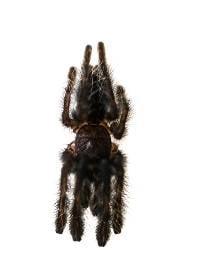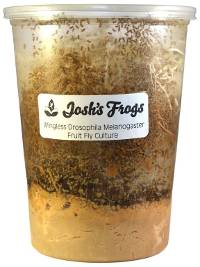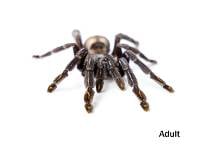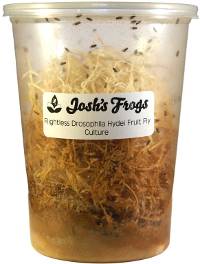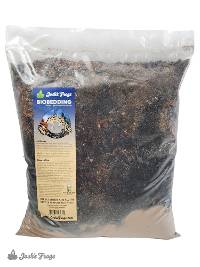Josh's Frogs
Kilimanjaro Mustard Tarantula - Pterinochilus chordatus "mastov" (Captive Bred)
Kilimanjaro Mustard Tarantula - Pterinochilus chordatus "mastov" (Captive Bred)
$59.99 0.0 out of 5 stars
(0)
0.0 out of 5 stars
(0)About This Product
SPECIAL NOTE: USPS forbids shipping venomous spiders or scorpions in the mail.
Because of this, we ship these animals FedEx priority overnight for a flat fee of $39.99.
Characteristics:
- An uncommon cousin of the popular Orange Baboon Tarantula, this more bronzed African fossorial is every bit as gorgeous.
- The Mastov locality is very rarely seen, especially in the US.
- Because not much is known about these beauties, it would be wise to assume that their bite is of the same medical significance as their brightly hued cousin and extra caution should be exercised when interacting with this spider.
Pterinochilus chordatus “mastov” is also known as the Kilimanjaro Mustard Baboon. Its scientific name has both Greek and Latin roots meaning wing/feather, lip/gill and “having a cord”
Enclosure: Pterinochilus chordatus is fossorial, meaning a taller enclosure filled mostly with substrate is ideal. The surface area of the enclosure should not be less than three times the diagonal leg span of the tarantula in any direction. This species does have semi arboreal tendencies, so providing them with a bit of height above the surface with plenty of web anchor points would not be amiss. Slings should have at least 2"-3" of substrate, adults 5"+.
Temperature: Natural range of Pterinochilus chordatus varies from 65°-90°, best kept mid to high 70° range, but temperatures have more wiggle room than other species.
Humidity: 50%-55%, Pterinochilus chordatus slings should be kept on lightly moist substrate. Ideally only ¼-⅓ of substrate surface should be moistened to give them ample room to get away from the moisture if they wish. This spider comes from a family that is particularly susceptible to molting issues and even death if they are kept overly moist and don’t have dry substrate to retreat to.
Size: Pterinochilus chordatus are .5-1" at time of sale with adults reaching up to around 5".
Age: Pterinochilus chordatus are at least 3-4 months at time of sale, while not much is known about this species, it is likely their lifespan is similar to that of their cousin with males living 3-4 years of age and females boasting a significantly longer lifespan of 12-15 years.
Feeding: At time of sale our Pterinochilus chordatus are eating hydei fruit flies two times a week, prey should size up with your tarantula, with the prey being no bigger than about the size of your tarantula's carapace. As they age you can feed less frequently, with adults eating every 10-14 days. Do not feed within a week of your tarantula molting to prevent injury to the tarantula.
Sexing: Due to age, Pterinochilus chordatus spiderlings sold by Josh's Frogs are sold as unsexed. Specimens of 2.5"-3" diagonal leg span will be able to start being accurately sexed. The most accurate method is always molt sexing, the molt of a female tarantula of appropriate size will have spermatheca and a uterus externus in between the top two sets of book lungs that will appear as a "flap" that will catch and open if a pin is gently run down this section of the old exoskeleton. Males will have a much more plain slit that will not budge with attempts to manipulate it.
Coloration: Pterinochilus chordatus slings are gray with a mustard colored abdomen, the mastov variety grow up to be very similar in appearance and pattern to their orange cousins, the main difference being that they are a beautiful bronze with black patterning.
Social behavior: This species should be kept alone, attempts at cohabitation will likely result in cannibalism.
Breeding: Spiders housed for breeding purposes should remain supervised when together and should only be attempted well fed. Mature males can be put in the enclosure of a mature female for courtship/mating. Remove male promptly after insertion is observed, or immediately if female is less than receptive.
Natural Range: Much of Africa, including (but probably not limited to): Ethiopia, Kenya, Somalia, Sudan, Tanzania and Uganda.
Links of Interest:
- Arachnoboards: a community of spider enthusiasts that will be able to or have already answered almost any question you can think of with regards to tarantulas.
Still not sure if the Kilimanjaro Mustard tarantula from Josh's Frogs is the right pet bug for you? Read the reviews below and see what other customers are saying!
Shipping
After placing an order containing a live animal, you will receive a scheduling email containing our JotForm scheduling link to schedule your new pet's delivery date.
With this scheduling link, you will be able to schedule your order's delivery up to 30 days in advance. You will be able to choose a date of delivery for Tuesday-Saturday (Saturday arrival depends on the carrier's service availability) with the estimated time of arrival generally being 12pm, or 4:30pm for more rural areas. Overnight lows must be above 40°F to ship directly to you (or above 30°F for FedEx Ship Center pickups) as well as below 90°F by estimated time of arrival.
If you require further assistance, or prefer to talk to one of our Customer Service agents, please feel free to reach out to our [email protected] email or our phone line 1-800-691-8178.
Other Customers Also Bought
Customer Reviews
0.0 out of 5 stars
Review data
5 star reviews
- 0%
4 star reviews
- 0%
3 star reviews
- 0%
2 star reviews
- 0%
1 star reviews
- 0%

